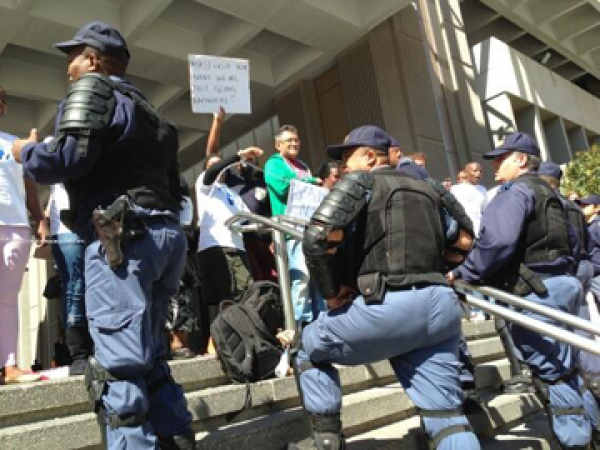The week in political activism

This week we have reports from Corruption Watch, the Social Justice Coalition, the International Organisation for Migration and the Aids Rights Alliance for Southern Africa.
Corruption Watch received over 500 school-related complaints
Since its launch in January 2012, Corruption Watch has received over 500 complaints of alleged corruption from schools across South Africa. In June 2013, Corruption Watch launched a two-year campaign to raise awareness about the problem.
Patience Mkosana, communications officer for Corruption Watch, told GroundUp, “Corruption in schools not only robs pupils of the benefits of feeding schemes, transport and textbooks, it also robs taxpayers of the ability to make a difference in the lives of disadvantaged children who only have education as a way out of poverty.”
You can report cases of corruption by calling 0800 023 456 (school hotline) or by SMSing 45142 (R1 per message). You can also email info [at] corruptionwatch.org.za or visit their website: www.corruptionwatch.org.za.
Productive period for Social Justice Coalition (SJC)
Phumeza Mlungwana, General Secretary of the SJC, told GroundUp that the past few months have been fruitful for the SJC. Back in September, 15 members chained themselves outside Mayor Patricia de Lille’s office in Cape Town to raise awareness on the continuing problem of sanitation facing informal settlements, and more particularly on the implementation plan for janitorial services. Members and supporters of the SJC were arrested and charged under the Illegal Gathering Act. Those convicted are due to appear at Cape Town Magistrate Court on 14 November.
In October, SJC conducted a successful social audit on refuse collection in Khayelitsha’s informal settlements. This ensures participation in the monitoring services and helps ensure that leaders are held accountable for government expenditure and service provision.
Also in October, the Constitutional Court ruled that the O’Regan-Pikoli Commission of Inquiry into policing in Khayelitsha can proceed.
Follow this link to find out more about SJC’s campaigns and work: http://www.sjc.org.za/.
International Organisation for Migration (IOM) organising International Migrants Day
With International Migrants Day next month on 18 December, the IOM in partnership with the United Nations High Commission (UNHCR) for Refugees and the City of Johannesburg is launching a campaign aimed at raising awareness about the positive contributions migrants make to South Africa.
Gaone Dixon of IOM says, “Migrants, including refugees and asylum seekers are often portrayed negatively in the press, and are used as scapegoats for social and economic problems. It is especially difficult to discuss migration in times of crisis and high unemployment.”
Clementine Nkweta-Salami, UNHCR’s Regional Representative for Southern Africa, says, “Refugees and asylum-seekers are migrants who have been forced to flee their homes due to war and persecution. While South Africa has an international obligation to receive refugees, it should not be perceived as a burden, but an opportunity for the country. Refugees contribute to the economy, pay taxes and bring a cultural diversity that should be celebrated.”
This year’s celebration also gives artists an opportunity to participate in a poster competition. Posters must demonstrate the positive contribution of migration in South Africa and showcase African unity. Twelve winners will be selected to have their work featured on the IOM 2014 Calendar.
A booklet featuring inspirational stories from South Africa’s migrant population will also be launched on International Migrants Day.
For more information on the IOM go to their website at http://www.iom.int/cms/en/sites/iom/home.html.
Aids Rights Alliance for Southern Africa (ARASA) at TB conference
ARASA represented the SADC region at the 44th Lung Conference which took place in Paris, France, from 28 October to 3 November.
Civil society organisations called on governments to stop the rhetoric around lung disease eradication and move into action in order to achieve the target ‘zero TB’.
ARASA called for patient-centered approaches to HIV/TB treatment, care and support; supported the integration of the WHO guidelines announced in July 2013; and called on the Global Fund to fight AIDS, Tuberculosis and Malaria to promote efforts which incorporate gender equality strategies and human rights in their national strategic plans.
This resulted in a board decision for the fund to start requesting robust proposals from countries which will now have to include human rights educational strategies.
ARASA hopes to work with in-country partners to undertake education on rights-based interventions.
The ARASA website is www.arasa.info.
Next: Abalimi Bezekhaya
Previous: A changed world requires ditching dogma

This article is licensed under a Creative Commons Attribution-NoDerivatives 4.0 International License.


